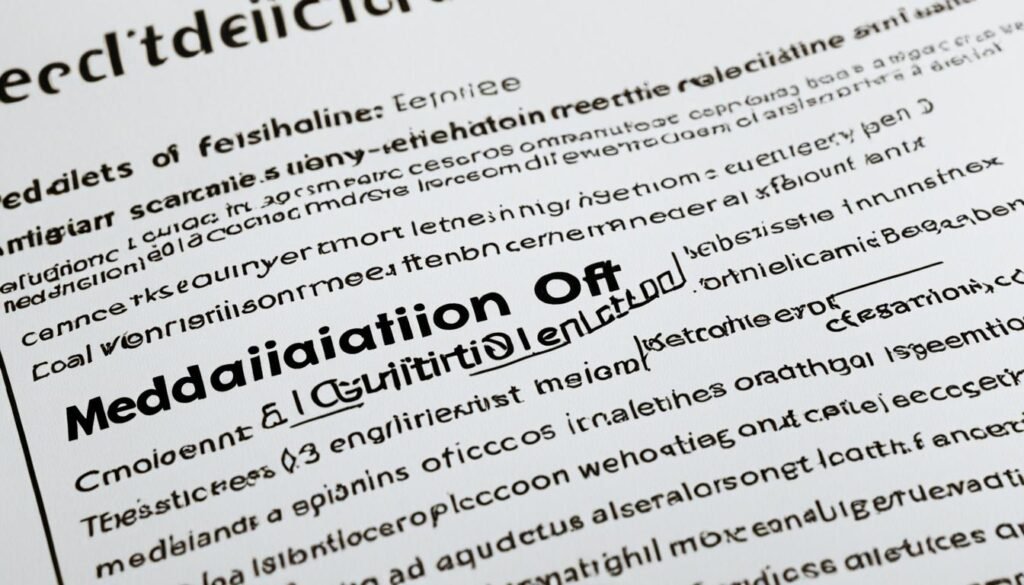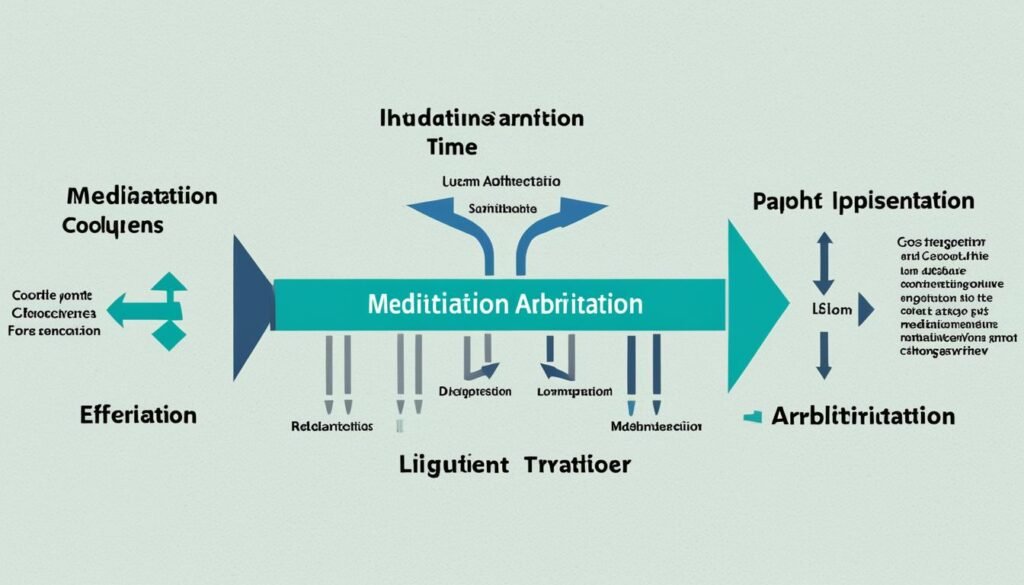Did you know that companies with over $1 billion in revenue spent a whopping $22.8 billion on outside legal costs in 20201? This fact shows how much money traditional lawsuits can cost businesses. But, there’s a better way to solve disputes that’s cost-effective, confidential, and efficient: mediation and arbitration.
Mediation and arbitration, together known as alternative dispute resolution (ADR) methods, have many benefits over traditional lawsuits. They help you handle conflicts better, keep important relationships strong, and lead to better results for your business. We’ll look into the main advantages of mediation and arbitration and how they can outperform litigation in many situations.
Key Takeaways
- Mediation and arbitration can be more cost-effective than going to court, with fees for arbitrators between $375 and $1,125 per hour2
- Arbitration cases usually get resolved quickly, taking about 475 days from start to finish, unlike litigation which can take 18 months to 3 years2
- These methods are private and confidential, keeping the process out of the public eye2
- You have more control over the outcome in mediation and arbitration than in court, where decisions are final3
- These methods can also help preserve important relationships between the parties, which is key in business or real estate disputes3
Understanding Mediation and Arbitration
When dealing with disputes, you have choices besides going to court. Mediation and arbitration are two key options. They make settling disputes quicker, cheaper, and friendlier.
What is Mediation?
Mediation is a process where a neutral mediator helps people in a dispute talk things out. The mediator helps both sides share their concerns and find common ground. They don’t make the final decision, but guide the way to a solution everyone can agree on4.
What is Arbitration?
Arbitration is different, as it’s a formal way to settle disputes. A neutral arbitrator listens to both sides and makes a final decision4. It’s often quicker and simpler than going to court, with fewer rules for presenting evidence.
Some people agree to use arbitration when they start a job or use certain services like phones or credit cards4. This means they agree to solve disputes through arbitration instead of court.
Many people prefer mediation and arbitration over going to court4. Managers often pick mediation because it helps solve conflicts fast and peacefully4.
Some use a mix of mediation and arbitration, called med-arb45. First, they try to settle through mediation. If that doesn’t work, they move to arbitration.
Choosing mediation, arbitration, or both can help you handle conflicts better and get good results465.

Key Benefits of Mediation and Arbitration Over Litigation
Mediation and arbitration are often better than traditional lawsuits for solving disputes. They are more affordable and quicker. These methods help people and businesses find solutions together.
Cost-Effective Dispute Resolution
Mediation and arbitration are cheaper than going to court7. If the parties agree quickly, mediation can save even more money7. Arbitration is also cheaper than a civil trial7. The FINRA Simplified Arbitration Process is a budget-friendly option for claims up to $50,0008.
Time-Efficient Process
Mediation and arbitration are quicker than lawsuits7. Mediation usually takes about three months to finish, showing how fast it is8. Arbitration is also quicker than a civil trial7. The FINRA arbitration process, with over 8,100 arbitrators, can handle many claims quickly8.

Choosing between mediation and arbitration depends on the case details7. Talking to legal experts can help pick the best way to solve disputes affordably and quickly7.
“Mediation is more collaborative while arbitration is adversarial in nature. Mediation provides a neutral third party to help parties resolve disputes themselves, while arbitration involves an arbitrator who decides the outcome.”
Benefits of Mediation and Arbitration Over Litigation
Confidentiality
Mediation and arbitration are great because they keep things private. They don’t happen in public like court cases do9. Everything said during these sessions stays private and can’t be used later. This is super important for sensitive or big disputes where people don’t want everyone to know.
Control Over Outcome
With mediation and arbitration, the people involved have a big say in the end result. They work with a neutral person to find a solution that everyone agrees to10. This way, they can make sure the outcome meets their needs, not just what a judge might decide.
In arbitration, the decision is final but the process is still more flexible than in court10. The parties get to pick the arbitrator and set the timeline. This is really helpful for complex cases where a judge might not understand the details.
“Mediation and arbitration offer a level of confidentiality and control over the outcome that is simply not possible in traditional litigation. This can be a game-changer for those seeking to resolve disputes in a more private and tailored manner.”
Overall, mediation and arbitration are great because they keep things private and let people have a say in the outcome910. This makes them a good choice for many people and businesses looking to settle disputes in a private way.
Preserving Relationships and Flexible Procedures
Mediation and arbitration are great for solving disputes without the need for court. They focus on keeping relationships strong and offer flexible ways to settle disputes11.
Preservation of Relationships
Mediation is great for keeping work relationships strong. Both sides have a say and can make a settlement that fits their situation12. It’s flexible and informal, perfect for solving issues that are hard to deal with in court.
Arbitration is a bit more formal but still lets the parties control the process. It’s great for keeping relationships in disputes where working together is important11.
Flexible Procedures
Mediation and arbitration are flexible11. They let parties shape the process to fit their needs. This makes sure the solution works for everyone involved. Traditional litigation is much more rigid.
In mediation, you can pick the place, time, and mediator12. Arbitration also lets you choose arbitrators with the right skills and set the rules of the process.
These methods help businesses and people solve disputes in a way that keeps relationships strong and outcomes positive31112.
Finality of Decisions and Avoidance of Public Scrutiny
Mediation and arbitration offer big benefits over going to court. They make decisions final and keep things private13. Arbitration decisions are final and binding, ending disputes for good13. The process is private, but the outcome is public13. Mediation lets parties settle without public eyes on them, keeping everything private13.
Arbitration is hard to appeal, making it a final solution13. Awards are usually the last word, with few chances to challenge them13. This certainty is key for sensitive or big disputes13. Plus, arbitration decisions are easy to enforce worldwide thanks to international agreements13.
Mediation and arbitration keep disputes out of the public eye13. Unlike court, they’re private affairs13. This is a big deal for cases with sensitive info or reputations at stake13. It means parties can settle without their private stuff being shared with everyone13.
Mediation and arbitration are great for settling disputes fast and privately131415.
Conclusion
Mediation and arbitration are better than traditional court fights for solving disputes16. They save money and time and help people talk better and keep their relationships16. These methods work well for many kinds of legal problems, like business or family issues1617.
If you’re dealing with a legal issue, the Super Attorneys Of Irvine at businesslawyersirvine.com can help you with mediation or arbitration1617. They make sure your rights are looked after and you get what you want1617. This way, you can skip the stress of court fights and keep your life on track.
Mediation and arbitration are great alternatives to going to court1617. They’re quicker, private, and help keep relationships strong1617. The Super Attorneys Of Irvine at businesslawyersirvine.com will help you find the best way to solve your problem.
FAQ
What are the key benefits of mediation and arbitration over traditional litigation?
How does mediation differ from arbitration?
What are the cost and time-saving benefits of mediation and arbitration?
How do mediation and arbitration differ in terms of confidentiality and control over the outcome?
How can mediation and arbitration help preserve relationships and provide flexible procedures?
What are the differences between the finality and public scrutiny of mediation and arbitration?
Source Links
- https://www.johnstonclem.com/news-insights/the-benefits-of-mediation-over-litigation/
- https://www.nolo.com/legal-encyclopedia/arbitration-pros-cons-29807.html
- https://law.pepperdine.edu/blog/posts/arbitration-vs-litigation-choosing-the-right-path.htm
- https://www.pon.harvard.edu/tag/mediation-and-arbitration/
- https://www.northcentralcollege.edu/news/2021/07/28/mediation-vs-arbitration
- https://www.metlife.com/stories/legal/mediation-vs-arbitration/
- https://www.forbes.com/advisor/legal/mediation-vs-arbitration/
- https://www.finra.org/arbitration-mediation/about/arbitration-vs-mediation
- https://www.eeoc.gov/10-reasons-mediate
- https://www.legalzoom.com/articles/the-basics-arbitration-vs-mediation
- https://medium.com/international-law-matters/arbitration-and-mediation-512549c10ba9
- https://mediationblog.kluwerarbitration.com/2023/06/14/mediation-vs-litigation-the-advantages-of-settling-out-of-court/
- https://www.lexisnexis.com/community/insights/legal/b/thought-leadership/posts/arbitration-vs-litigation
- https://arbitrationblog.kluwerarbitration.com/2022/11/11/justice-versus-finality-is-it-time-to-revisit-the-rules-on-the-revision-of-arbitral-awards/
- https://doe.gov.in/files/circulars_document/Guidelines_for_Arbitration_and_Mediation_in_Contracts_of_Domestic_Public_Procurement.pdf
- https://www.giambronelaw.com/site/advice/dispute-resolution/family-disputes/mediation-in-dispute-resolution/
- https://www.fightingforyou.com/resource-center/articles/litigation-vs-alternative-dispute-resolution/

